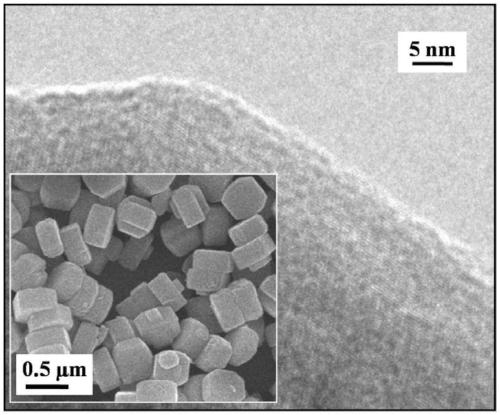A kind of synthetic method of mesoporous zeolite
A mesoporous zeolite and zeolite technology, applied in the field of synthetic mesoporous zeolite, can solve the problems of wide pore size distribution, uneven mesoporous, destructive crystal structure, etc., and achieve the effect of narrow pore size distribution and excellent performance
- Summary
- Abstract
- Description
- Claims
- Application Information
AI Technical Summary
Problems solved by technology
Method used
Image
Examples
Embodiment 1
[0033] Weigh 25 mg of SWCNHs and add it into ethanol for ultrasonic dispersion. In another reaction vessel was added 16mg NaOH, 4mL H 2 O and 1.2mL TPAOH, stirred by magnetic force, poured the dispersed SWCNHs into the reaction liquid, stirred continuously to volatilize the ethanol until the ethanol was completely volatilized, then added 1.117mL TEOS. Stir at room temperature, age for 10 h, then transfer the reaction mixture into a polytetrafluoroethylene-lined hydrothermal reactor, and perform hydrothermal synthesis reaction at 150° C. for 5 days. After the completion of the synthesis reaction, centrifugation, washing, drying, and finally calcination at 600 ° C to remove SWCNHs to obtain Silicate-1 zeolite containing mesoporous.
Embodiment 2
[0035] Weigh 100mg of SWCNHs into ethanol and ultrasonically disperse. In another reaction vessel was added 4 mL of H 2 O and 1.2mL TPAOH, magnetically stirred, poured the dispersed SWCNHs into the reaction solution, and stirred continuously to volatilize the ethanol until the ethanol was completely volatilized, then added 1.117mL TEOS. Stir at room temperature, age for 10 h, transfer the reaction mixture into a polytetrafluoroethylene-lined reactor, and perform hydrothermal synthesis at 180° C. for 2 days. After the synthesis reaction is finished, it is centrifuged, washed, dried, and finally calcined at 600° C. to remove SWCNHs to obtain Silicate-1 zeolite containing mesoporous pores.
Embodiment 3
[0037] Weigh 50mg of SWCNHs into ethanol and ultrasonically disperse. In another reaction vessel was added 4 mL of H 2O and 1.2mL TPAOH, magnetically stirred, poured the dispersed SWCNHs into the reaction solution, and stirred continuously to volatilize the ethanol until the ethanol was completely volatilized, then added 1.117mL TEOS. Stir at room temperature, age for 10 h, transfer the reaction mixture into a polytetrafluoroethylene-lined hydrothermal reactor, and perform a hydrothermal synthesis reaction at 180° C. for 2 days. After the synthesis reaction is finished, it is centrifuged, washed, dried, and finally calcined at 600° C. to remove SWCNHs to obtain Silicate-1 zeolite containing mesoporous pores.
PUM
| Property | Measurement | Unit |
|---|---|---|
| diameter | aaaaa | aaaaa |
| length | aaaaa | aaaaa |
| pore size | aaaaa | aaaaa |
Abstract
Description
Claims
Application Information
 Login to View More
Login to View More - R&D
- Intellectual Property
- Life Sciences
- Materials
- Tech Scout
- Unparalleled Data Quality
- Higher Quality Content
- 60% Fewer Hallucinations
Browse by: Latest US Patents, China's latest patents, Technical Efficacy Thesaurus, Application Domain, Technology Topic, Popular Technical Reports.
© 2025 PatSnap. All rights reserved.Legal|Privacy policy|Modern Slavery Act Transparency Statement|Sitemap|About US| Contact US: help@patsnap.com

